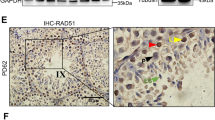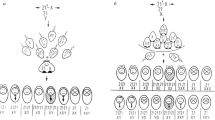Abstract
ACCORDING to Lifschytz and Lindsley1,2, the basic control mechanism of spermatogenesis of all male heterogametic organisms consists of inactivation of the X chromosome during differentiation of germ cells. The absence of this control mechanism in female meiosis, where both X chromosomes are active3,4, could explain why only male gametogenesis is impaired in the carriers of some chromosomal aberrations.
This is a preview of subscription content, access via your institution
Access options
Subscribe to this journal
Receive 51 print issues and online access
$199.00 per year
only $3.90 per issue
Buy this article
- Purchase on Springer Link
- Instant access to full article PDF
Prices may be subject to local taxes which are calculated during checkout
Similar content being viewed by others
References
Lifschytz, E., in Proc. int. Symp. Genet. Spermatozoon (edit. by Beatty, R. A., and Gluecksohn-Waelsch, S.), 223–232 (University of Edinburgh, Edinburgh 1972).
Lifschytz, E., and Lindsley, D. L., Proc. natn. Acad. Sci. U.S.A., 69, 182–186 (1972).
Epstein, C. J., Science, 163, 1078 (1969).
Gartler, S. M., Liskay, R. M., and Gant, N., Expl Cell Res., 82, 464–466 (1973).
Forejt, J., Cytogenet. Cell Genet., 13, 369–383 (1974).
Lyon, M. F., and Meredith, R., Cytogenetics, 5, 335–354 (1966).
Cacheiro, N. L. A., Russell, L. B., and Swartout, M. S., Genetics, 76, 73–91 (1974).
Searle, A. G., Genetics, 78, 173–186 (1974).
Boer, P., de, and Groen, A., Cytogenet. Cell Genet., 13, 489–510 (1974).
Carter, T. C., Lyon, M. F., and Phillips, R. J. S., J. Genet., 53, 154–166 (1958).
Bishop, D. W., in The Testis (edit. by Gomes, W. R., and Vandermark, N. L.), 41–61 (Academic, London and New York, 1970).
Cattanach, B. M., and Moseley, H., Cytogenet. Cell Genet., 12, 264–287 (1973).
Forejt, J., and Iványi, P., Genet. Res., 24, 189–206 (1975).
Searle, A. G., and Beechey, C. V., Mutat. Res., 22, 63–72 (1974).
Dobzhansky, T., Genetics and the Origin of Species (Columbia University, New York, 1951).
Dunn, L. C., Science, 144, 260–263 (1964).
Lyon, M. F., and Meredith, R., Heredity, 19, 313–325 (1964).
Snell, G. D., Folia biol., 14, 335–358 (1968).
Iványi, P., Curr. Top. Microbiol Immun., 53, 1–90 (1970).
Artzt, K., and Bennett, D., Nature, 256, 545–547 (1975).
Stimpfling, J. H., Transplant. Bull, 27, 109–111 (1961).
Author information
Authors and Affiliations
Rights and permissions
About this article
Cite this article
FOREJT, J. Spermatogenic failure of translocation heterozygotes affected by H–2-linked gene in mouse. Nature 260, 143–145 (1976). https://doi.org/10.1038/260143a0
Received:
Accepted:
Issue Date:
DOI: https://doi.org/10.1038/260143a0
This article is cited by
-
Univalent sex chromosomes in spermatocytes of Sxr-carrying mice
Chromosoma (1988)
-
XY pair associates with the synaptonemal complex of autosomal male-sterile translocations in pachytene spermatocytes of the mouse (Mus musculus)
Chromosoma (1981)
-
Synaptonemal complexes of mouse and human pachytene chromosomes visualized by silver staining in air-dried preparations
Chromosoma (1979)
Comments
By submitting a comment you agree to abide by our Terms and Community Guidelines. If you find something abusive or that does not comply with our terms or guidelines please flag it as inappropriate.



